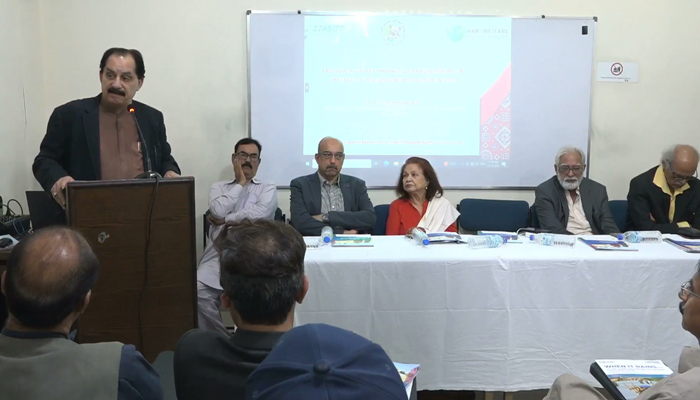Rights activists demand electoral reforms to ensure workers’ representation in parliament
Workers, and human rights and civil society activists have demanded due representation of the working class in Parliament by implementing electoral reforms.
The demand was made at a discussion on the key findings of a report titled ‘The State of Peasants Rights in Sindh in 2022’ jointly organised by the Hari Welfare Association and Sindh Abhyas Academy at the Shaheed Zulfikar Ali Bhutto Institute of Science and Technology on Wednesday.
The participants of the discussion also demanded effective implementation of agriculture reforms to contain the hold of big landlords on resources.
They key speakers included National Commission for Human Rights Sindh Member Anis Haroon, Pakistan Institute of Labour Education and Research (Piler) Executive Director Karamat Ali, trade unionists Habibuddin Junaidi, Malik Ghulam Mehboob and Liaqat Sahi, researcher Dr Nazir Mahmood, Dr Riaz Shaikh, Zulfiqar Shah and Ishak Soomro.
Anis said that bonded labour was a serious issue in the country. She pointed out that though good laws were enacted, their implementation was very poor in Pakistan.
She lamented that a law for the protection of the rights of women agriculture workers was made in Sindh in 2018 but its rules had not been made so far.
The Piler executive director demanded that workers’ representatives be made members of Parliament. He said Pakistan was the only country in the world where feudalism has expanded.
Junaidi of the Peoples Labour Bureau said the Sindh government had made many pro-workers laws after the 18th Amendment in the Constitution.
Hari Welfare Association President Akram Khaskheli remarked that the report had highlighted the peasants’ issues in Sindh. He added that the report had recommended the Sindh government to withdraw its appeal against the Sindh High Court’s (SHC) decision on the Tenancy Act and comply with all of the SHC's directives.
The Sindh government should provide compensation to peasants and rural workers who had suffered losses in terms of their lives, livelihoods, livestock, and properties due to floods and natural calamities, he said.
The government should pass seed laws to preserve the peasants’ rights to produce, exchange, purchase, and sell their produce seeds in the market, as well as to protect the general public from genetically modified products, Khaskheli added.
He said the provincial government should develop a special plan to implement the Sindh Women Agriculture Workers Act and the labour ministry should notify the board and field offices around the province, and register the women who worked in the agriculture sector.
-
 Columbia University Sacks Staff Over Epstein Partner's ‘backdoor’ Admission
Columbia University Sacks Staff Over Epstein Partner's ‘backdoor’ Admission -
 Ozzy Osbourne's Family Struggles Behind Closed Doors
Ozzy Osbourne's Family Struggles Behind Closed Doors -
 Dua Lipa Claims Long-distance Relationship 'never Stops Being Hard'
Dua Lipa Claims Long-distance Relationship 'never Stops Being Hard' -
 BTS Moments Of Taylor Swift's 'Opalite' Music Video Unvieled: See Photos
BTS Moments Of Taylor Swift's 'Opalite' Music Video Unvieled: See Photos -
 Robin Windsor's Death: Kate Beckinsale Says It Was Preventable Tragedy
Robin Windsor's Death: Kate Beckinsale Says It Was Preventable Tragedy -
 Rachel Zoe Shares Update On Her Divorce From Rodger Berman
Rachel Zoe Shares Update On Her Divorce From Rodger Berman -
 Kim Kardashian Officially Takes Major Step In Romance With New Boyfriend Lewis Hamilton
Kim Kardashian Officially Takes Major Step In Romance With New Boyfriend Lewis Hamilton -
 YouTube Tests Limiting ‘All’ Notifications For Inactive Channel Subscribers
YouTube Tests Limiting ‘All’ Notifications For Inactive Channel Subscribers -
 'Isolated And Humiliated' Andrew Sparks New Fears At Palace
'Isolated And Humiliated' Andrew Sparks New Fears At Palace -
 Google Tests Refreshed Live Updates UI Ahead Of Android 17
Google Tests Refreshed Live Updates UI Ahead Of Android 17 -
 Ohio Daycare Worker 'stole $150k In Payroll Scam', Nearly Bankrupting Nursery
Ohio Daycare Worker 'stole $150k In Payroll Scam', Nearly Bankrupting Nursery -
 Michelle Yeoh Gets Honest About 'struggle' Of Asian Representation In Hollywood
Michelle Yeoh Gets Honest About 'struggle' Of Asian Representation In Hollywood -
 Slovak Fugitive Caught At Milano-Cortina Olympics To Watch Hockey
Slovak Fugitive Caught At Milano-Cortina Olympics To Watch Hockey -
 King Charles Receives Exciting News About Reunion With Archie, Lilibet
King Charles Receives Exciting News About Reunion With Archie, Lilibet -
 Nvidia Expands AI Infrastructure With Nevada Data Centre Lease
Nvidia Expands AI Infrastructure With Nevada Data Centre Lease -
 Royal Family Shares Princess Anne's Photos From Winter Olympics 2026
Royal Family Shares Princess Anne's Photos From Winter Olympics 2026




